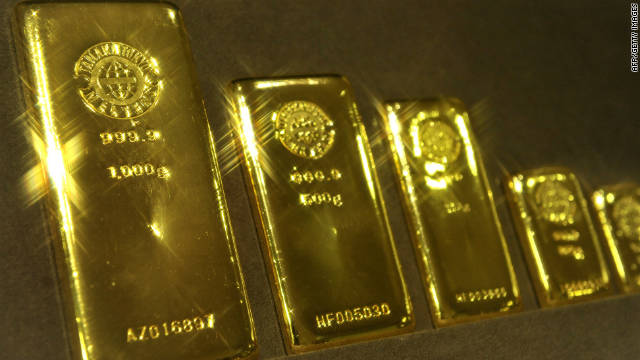April 11, 2013 -- Updated 0319 GMT (1119 HKT)

(Financial
Times) --
Cyprus has agreed to sell gold worth €400m from its reserves as a
contribution to an international bailout, roiling the precious metal
markets as investors feared it could set a precedent for other
troubled eurozone countries.
Nicosia's plan to dispose of most of its gold
holdings would be the first such sale by a country seeking
international assistance since the Asian financial crisis in 1997-98,
when South Korea asked the public to donate jewellery to the central
bank for the good of the nation.
"I think this could be a turning point,"
said Jonathan Spall, director of precious metals at Barclays Capital.
"Central bank stocks of gold which had looked to be ringfenced
in the bailout process could now seemingly come in to play."
A draft bailout document seen by the Financial
Times, said: "The Cypriot authorities have committed to sell the
excess amount of gold reserves owned by the Republic."
The
document also shows that losses imposed on junior debt-holders and
uninsured depositors in Cyprus's two largest banks -- a condition of
the €10bn EU/IMF bailout -- are now expected to raise €10.6bn
rather than the €5.8bn originally envisaged.
The
gold price, which has been weak on investor selling since the start
of the year, was hit by the Cyprus news, dropping 1.65 per cent on
the day to $1,559 a troy ounce.
Cyprus
is the first euro member to sell its reserves in the three-year
eurozone crisis. To raise €400m, it will need to sell just over 10
tonnes of the yellow metal of the 13.9 tonnes held by the central
bank. The central bank's holdings account for 62 per cent of its
total official reserves, according to the World Gold Council, the
industry lobby group.
Governments
in the eurozone's beleaguered southern periphery tend to hold a large
part of their total foreign reserves in gold -- the Italian central
bank holds 2,451 tonnes of gold, over 70 per cent of its total
reserves, while Portugal's holding of 383 tonnes accounts for 90 per
cent.
James
Steel, precious metals analyst at HSBC in New York, said the Cypriot
plan "has been a psychological blow to the market". "The
market has taken a pretty hard tumble," he added.
However,
one Cyprus official said the move was likely to be a "one-off".
Some analysts said it would be unlikely for larger countries to turn
to gold sales to reduce their debts.
The
Cyprus programme now faces the hurdle of Germany parliamentary
approval. It will be presented to a special meeting of the budget
committee of the German Bundestag on April 16, and to a full plenary
session of the parliament on April 18.
Parliamentary
budget experts in Berlin were still studying the details on
Wednesday, and one opposition official said that "there are
still many questions to be answered" before the Bundestag vote.
The
bail-out document - known as the debt sustainability analysis, paints
a grim picture for the Cypriot economy, forecasting it will contract
by a cumulative 12.5 per cent 2013-14. Public sector deby will peak
at 126.3 per cent of GDP in 2015. The documents also warns of
"downside risks" to the programme from a deeper than
expected recession.
European
central banks agreed in 1999 to limit their gold sales in an effort
to prop up prices after the precious metal plunged to a 20-year low
of $250 per troy ounce.
Since
then, central banks have turned from net sellers to net buyers, lead
by strong purchases in Asia. Last year, the so-called official sector
bought the most gold in 48 years.
Additional
reporting by Jack Farchy
No comments:
Post a Comment